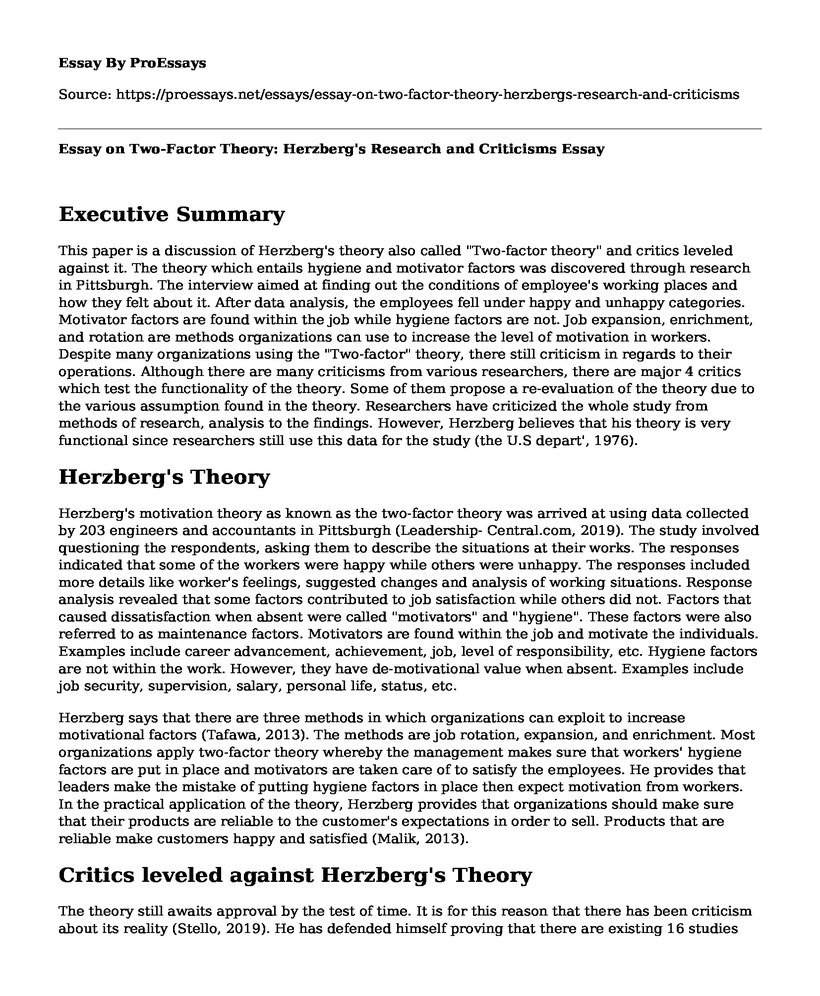Executive Summary
This paper is a discussion of Herzberg's theory also called "Two-factor theory" and critics leveled against it. The theory which entails hygiene and motivator factors was discovered through research in Pittsburgh. The interview aimed at finding out the conditions of employee's working places and how they felt about it. After data analysis, the employees fell under happy and unhappy categories. Motivator factors are found within the job while hygiene factors are not. Job expansion, enrichment, and rotation are methods organizations can use to increase the level of motivation in workers. Despite many organizations using the "Two-factor" theory, there still criticism in regards to their operations. Although there are many criticisms from various researchers, there are major 4 critics which test the functionality of the theory. Some of them propose a re-evaluation of the theory due to the various assumption found in the theory. Researchers have criticized the whole study from methods of research, analysis to the findings. However, Herzberg believes that his theory is very functional since researchers still use this data for the study (the U.S depart', 1976).
Herzberg's Theory
Herzberg's motivation theory as known as the two-factor theory was arrived at using data collected by 203 engineers and accountants in Pittsburgh (Leadership- Central.com, 2019). The study involved questioning the respondents, asking them to describe the situations at their works. The responses indicated that some of the workers were happy while others were unhappy. The responses included more details like worker's feelings, suggested changes and analysis of working situations. Response analysis revealed that some factors contributed to job satisfaction while others did not. Factors that caused dissatisfaction when absent were called "motivators" and "hygiene". These factors were also referred to as maintenance factors. Motivators are found within the job and motivate the individuals. Examples include career advancement, achievement, job, level of responsibility, etc. Hygiene factors are not within the work. However, they have de-motivational value when absent. Examples include job security, supervision, salary, personal life, status, etc.
Herzberg says that there are three methods in which organizations can exploit to increase motivational factors (Tafawa, 2013). The methods are job rotation, expansion, and enrichment. Most organizations apply two-factor theory whereby the management makes sure that workers' hygiene factors are put in place and motivators are taken care of to satisfy the employees. He provides that leaders make the mistake of putting hygiene factors in place then expect motivation from workers. In the practical application of the theory, Herzberg provides that organizations should make sure that their products are reliable to the customer's expectations in order to sell. Products that are reliable make customers happy and satisfied (Malik, 2013).
Critics leveled against Herzberg's Theory
The theory still awaits approval by the test of time. It is for this reason that there has been criticism about its reality (Stello, 2019). He has defended himself proving that there are existing 16 studies that have used his findings successfully. Some of the major critics are as follows:
- There is a theory's assumption that satisfied or happy workers are more productive.
- An aspect that motivates one person could be a de-motivating aspect for another person.
- The theory does not consider people's personality characters that can contribute to a different response to hygiene or motivator factor.
- That the two factors could lead to job dissatisfaction and satisfaction, therefore, the research of the hygiene and motivator factors should be re-evaluated (Jones, 2005).
References
Jones, N. (2005). Does Herzberg's motivation theory have staying power?. [online] pp.1-10. Available at: https://www.researchgate.net/publication/240257333_Does_Herzberg's_motivation_theory_have_staying_power [Accessed 13 May 2019].
Leadership- Central.com. (2019). Two Factor Theory. Retrieved from https://www.leadership-central.com/two-factor-theory.html
Malik, M. (2013). Towards Understanding Controversy on Herzberg Theory of Motivation. pp.1-6.
Stello, C. M. (2019). Herzberg's Two-Factor Theory 1 Herzberg's Two-Factor Theory of Job Satisfaction: An Integrative Literature Review. Retrieved from https://www.academia.edu/26679106/Herzbergs_Two-Factor_Theory_1_Herzbergs_Two-Factor_Theory_of_Job_Satisfaction_An_Integrative_Literature_Review
Tafawa, A. (2013). AN EMPIRICAL ANALYSIS OF HERZBERG'S TWO-FACTOR THEORY. [online] p.1. Available at: https://www.researchgate.net/publication/305393390_AN_EMPIRICAL_ANALYSIS_OF_HERZBERGS_TWO-FACTOR_THEORY [Accessed 13 May 2019].
US Department of Commerce (1976). HERZBERG'S TWO-FACTOR THEORY OF JOB SATISFACTION. [online] pp.1-45. Available at: https://apps.dtic.mil/dtic/tr/fulltext/u2/a033814.pdf [Accessed 13 May 2019].
Cite this page
Essay on Two-Factor Theory: Herzberg's Research and Criticisms. (2023, Jan 04). Retrieved from https://proessays.net/essays/essay-on-two-factor-theory-herzbergs-research-and-criticisms
If you are the original author of this essay and no longer wish to have it published on the ProEssays website, please click below to request its removal:
- The Research Sequence
- The Human Resource Problem of Stagecoach Group Case Study
- The Accounting Profession and Bankrate Case Paper Example
- The New Data From the Interview Responses HR Paper Example
- Research Articles Analysis on the Behaviors of People Paper Example
- Paper on Employee Training & Development: Vital for Organizations to Beat Competition
- Lead Analyst's Challenge: Persuading Stakeholders With Data - Free Report Example







